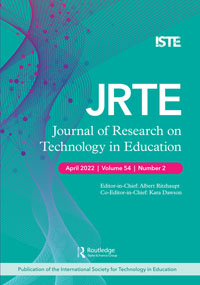Current publications
Selected publications of the chair
A detailed list of further publications of the chair can be found in the CRIS research information system.
Mixed Methods Research on Reflective Writing in Teacher Education
Gläser-Zikuda, M., Zhang, C., Hofmann, F., Plößl, L., Pösse, L., & Artmann, M. (2024). Mixed Methods Research on Reflective Writing in Teacher Education. Frontiers in Psychology, 15. https://doi.org/DOI:10.3389/fpsyg.2024.1394641
In this paper, mixed methods research is presented and discussed in the context of research on reflective writing for the professional development of pre-service teachers. First, we present prominent theoretical frameworks to analyze reflective writings. Second, we review relevant methodological approaches of research on reflective writings in teacher education, such as qualitative, quantitative and mixed methods. Third, we present a study from our research lab combining qualitative content analysis and linguistic analyses as an example for a concurrent mixed method approach. The results of the qualitative content analysis indicated that 198the reflective writingsons of 198 pre-service teachers were primarily descriptive and on a low level. Computational linguistic analyses revealed that affective and cognitive terminology utilization in reflective writing differed significantly across the different levels of reflection, with a higher frequency of such terms correlating with deeper levels of reflection. Thus, essential challenges and opportunities of implementing such a mixed method study to analyze reflective writings are illustrated and discussed. Finally, we conclude the paper by discussing on how mixed methods approaches might be further advanced in the field of reflective writing research in teacher education.
Mixed methods in research on motivation and emotion
Hagenauer, G., Muehlbacher, F., Kuhn, C., Stephan, M., & Gläser-Zikuda, M. (2024). Mixed methods in research on motivation and emotion. In Gerda Hagenauer, Rebecca Lazarides, Hanna Järvenoja (Eds.), Motivation and Emotion in Learning and Teaching across Educational Contexts. Theoretical and Methodological Perspectives and Empirical Insights. (pp. 163-177). London: Taylor and Francis. https://doi.org/10.4324/9781003303473
The investigation of emotions and motivation as individual processes interacting with the (socio-historical) context is a complex and highly dynamic endeavour that requires an adequate methodology. Mixed-methods research has represented a promising and increasingly popular approach in this context since the late 1990s. In general, mixed-methods studies aim to explore (educational) phenomena by meaningfully combining qualitative and quantitative methods to paint a more comprehensive and complete picture of the phenomenon under study. The complementary function of quantitative and qualitative approaches is frequently addressed as a key advantage of mixed-methods projects, relying on different types of parallel or sequential research designs. In this contribution, we first examine why mixed methods may be fruitful in research on emotion and motivation in education. We then introduce and discuss our recent empirical studies applying a mixed-methods design to explore emotion and motivation in different educational contexts. We conclude with a general reflection on future agendas for mixed-methods research on motivation and emotion.
The connection between resilience, self-efficacy and social relationships in families and schools
Obermeier, R., Lutz, V., Fuchs, K., Nowak, M. & Gläser-Zikuda, M. (2024). Zum Zusammenhang zwischen Resilienz, Selbstwirksamkeit und Sozialbeziehung in Familie und Schule. Eine Mehrebenenanalyse. Zeitschrift für Pädagogische Psychologie, 1-11, https://doi.org/10.1024/1010-0652/a000380
Some pupils are better than others at overcoming challenges at school. This is attributed to their resilience, among other things. Resilience describes the processual ability to adapt to adverse situations, which is stimulated by interactions between different systems. Individual and contextual factors are central to this adaptive capacity of individual systems, which can have both a supportive and protective effect and include self-efficacy expectations and social relationships. The contextual conditions at school are characterised by a multi-level structure, which has not yet been taken into account when analysing the development of resilience. The present study uses a sample of 655 pupils in grades 5-9 to show that school self-efficacy expectations, the quality of the relationship between teachers and pupils and the family climate at an individual level as well as the pupils’ willingness to help at a class level are linked to their resilience. The study thus provides evidence of the importance of individual and social resources for resilience development, but also demonstrates a correlation between variables at an aggregated class level. Approaches to promoting resilience development must therefore focus on both the individual and the class level.
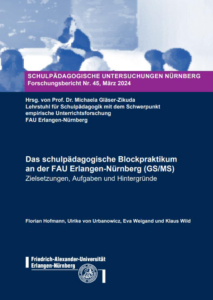
SUN series, issue no. 45
Hofmann, F., Urbanowicz v., U., Weigand, E. & Wild, K. (2024). Das schulpädagogische Blockpraktikum an der FAU Erlangen-Nürnberg (GS/MS) – Zielsetzungen, Aufgaben und Hintergründe (= SUN, Schulpädagogische Untersuchungen Nürnberg, Nr. 45). Nürnberg: Lehrstuhl für Schulpädagogik mit dem Schwerpunkt empirische Unterrichtsforschung
In the 45th edition of Schulpädagogische Untersuchungen Nürnberg, the authors take an in-depth look at the subject areas of school pedagogy on which the school pedagogy (block) internship at FAU (primary school/middle school) focuses. In particular, the areas of lesson planning and analysis, pedagogical diagnostics, classroom management and dealing with disruptions as well as professional reflection are each located in the theoretical discourse, tasks from the template for the internship documentation are explained and then illustrated using examples. This SUN edition is aimed at all teacher trainers who are directly or indirectly involved in practical phases at various levels, as well as interested academics. This volume is an almost indispensable guide for all teacher trainees and traineeship teachers who are completing or supervising the school pedagogical (block) traineeship at primary and secondary schools at FAU: Scientific backgrounds, practical explanations, concrete assistance and examples provide targeted help in dealing with the tasks of traineeship documentation.
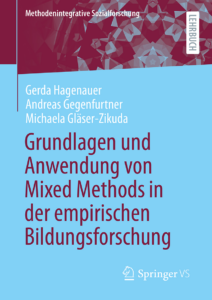 Basics and application of mixed methods in empirical educational research
Basics and application of mixed methods in empirical educational research
Hagenauer, G., Gegenfurtner, A., & Gläser-Zikuda, M. (2024). Basics and application of mixed methods in empirical educational research. Berlin: Springer.
This book provides an insight into mixed methods in empirical educational research. The focus is on the combination of qualitative and quantitative research approaches, which are currently being discussed very prominently in empirical educational research. The content is presented in an understandable way for both students and researchers who have not yet dealt with mixed methods. Therefore, the methodological basics are briefly described (with references to specialised literature) and linked to concrete examples from empirical educational research.
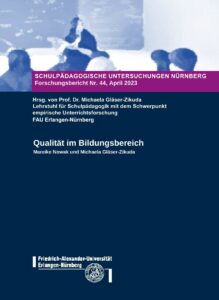
SUN series, issue no. 44
Nowak, M. & Gläser-Zikuda, M. (Hrsg.). Qualität im Bildungsbereich (= SUN, Schulpädagogische Untersuchungen Nürnberg, Nr. 44). Nürnberg: Lehrstuhl für Schulpädagogik mit dem Schwerpunkt empirische Unterrichtsforschung
This edition provides a diverse insight into quality and quality processes in education and is particularly recommended for students on the Master’s degree program in Educational Research on Learning and Instruction.
Available from the office of the Lehrstuhl für Schulpädagogik mit dem Schwerpunkt empirische Unterrichtsforschung.
Fostering Students’ Situational Interest in Physics: Results from a Classroom-Based Intervention Study
Henriette Brakhage, Alexander Gröschner, Michaela Gläser-Zikuda & Gerda Hagenauer (2023). Fostering Students’ Situational Interest in Physics: Results from a Classroom-Based Intervention Study, DOI: 10.1007/s11165-023-10120-x
Research indicates that students’ interest in science decreases during their school years. To counteract this, a quasi-experimental instructional intervention was designed in which we addressed students’ leisure interests to foster their (situational) interest in physics. Students in the intervention group got the opportunity to choose topics matching their leisure interests (e.g. sports, music) and were encouraged to reflect on and discuss the application of principles of semiconductor physics to those topics throughout the intervention with a duration over 11 lessons. The intervention group consisted of 60 students from German high-track schools; another 55 students comprised the control group. The results of a MANCOVA analysis indicate that the instructional intervention succeeded in triggering students’ catch and hold component of situational interest during all four phases of the lesson series. Furthermore, behavioural disengagement developed more positively for students in the intervention group, while no significant effects were found for their behavioural engagement, their interest in physics-related activities in leisure or their general interest in physics classes in school. The results suggest that addressing students’ leisure interests in physics classes can promote their situational interest and reduce their behavioural disengagement in physics.
Digital readiness and its effects on higher education students’ socio-emotional perceptions in the context of the COVID-19 pandemic
Marion Händel, Melanie Stephan, Michaela Gläser-Zikuda, Bärbel Kopp, Svenja Bedenlier & Albert Ziegler (2022). Digital readiness and its effects on higher education students’ socio-emotional perceptions in the context of the COVID-19 pandemic. Journal of Research on Technology in Education, 54:2, 267-280, DOI: 10.1080/15391523.2020.1846147
The current study investigated how ready higher education students were for emergency remote teaching due to the COVID-19 pandemic and how this influenced their socio-emotional perceptions. Results of N = 1,826 higher education students indicate that they seem to be ready for digital learning. A k-means cluster analysis revealed two groups of students that significantly differed with respect to their readiness for digital learning (in terms of technology equipment availability, prior experiences with e-learning, and skills for digital learning). Finally, students’ socio-emotional perceptions, that is, stress-related emotions (worries, tension, joy, and overload) as well as social and emotional loneliness significantly differed due to cluster membership. Hence, the study points a need for support of higher education students in successfully coping with the challenges of emergency remote studying.
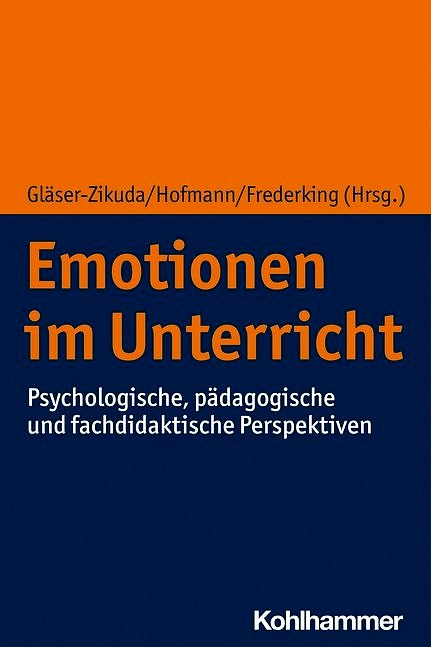 Emotions in the classroom
Emotions in the classroom
Gläser-Zikuda, M., Hofmann, F. & Frederking, V. (Hrsg.) (2021). Emotionen im Unterricht. Psychologische, pädagogische und fachdidaktische Perspektiven. Stuttgart: Kohlhammer.
Emotions are crucial for the success of teaching and learning processes. Whether children enjoy going to school or not depends largely on whether they feel joy and pride or anger and fear in the classroom and when interacting with teachers and classmates. The individual contributions in this volume examine the emotions of learners and teachers from the perspectives of educational philosophy, educational theory, pedagogy, psychology and subject didactics. Theoretical and empirical approaches are given equal consideration.
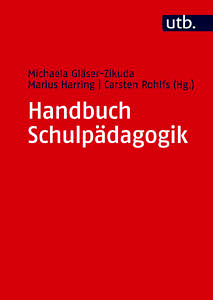
Handbook of school pedagogy
Harring, M., Rohlfs, C. & Gläser-Zikuda, M. (Hrsg.) (2018). Handbuch Schulpädagogik. Münster: Waxmann.
School is examined here from an interdisciplinary, international and empirical perspective. Historical, educational, sociological and psychological perspectives, research methods, school types and systems, (subject) didactics, diagnostics, teacher professionalisation, educational standards and current challenges are explained and discussed.
